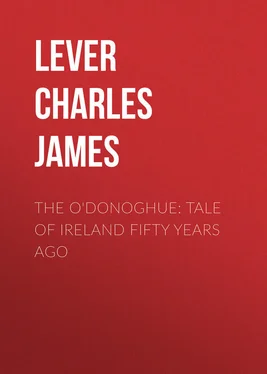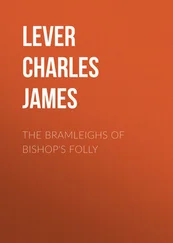Charles Lever - The O'Donoghue - Tale of Ireland Fifty Years Ago
Здесь есть возможность читать онлайн «Charles Lever - The O'Donoghue - Tale of Ireland Fifty Years Ago» — ознакомительный отрывок электронной книги совершенно бесплатно, а после прочтения отрывка купить полную версию. В некоторых случаях можно слушать аудио, скачать через торрент в формате fb2 и присутствует краткое содержание. Издательство: Иностранный паблик, Жанр: literature_19, foreign_antique, foreign_prose, на английском языке. Описание произведения, (предисловие) а так же отзывы посетителей доступны на портале библиотеки ЛибКат.
- Название:The O'Donoghue: Tale of Ireland Fifty Years Ago
- Автор:
- Издательство:Иностранный паблик
- Жанр:
- Год:неизвестен
- ISBN:нет данных
- Рейтинг книги:4 / 5. Голосов: 1
-
Избранное:Добавить в избранное
- Отзывы:
-
Ваша оценка:
- 80
- 1
- 2
- 3
- 4
- 5
The O'Donoghue: Tale of Ireland Fifty Years Ago: краткое содержание, описание и аннотация
Предлагаем к чтению аннотацию, описание, краткое содержание или предисловие (зависит от того, что написал сам автор книги «The O'Donoghue: Tale of Ireland Fifty Years Ago»). Если вы не нашли необходимую информацию о книге — напишите в комментариях, мы постараемся отыскать её.
The O'Donoghue: Tale of Ireland Fifty Years Ago — читать онлайн ознакомительный отрывок
Ниже представлен текст книги, разбитый по страницам. Система сохранения места последней прочитанной страницы, позволяет с удобством читать онлайн бесплатно книгу «The O'Donoghue: Tale of Ireland Fifty Years Ago», без необходимости каждый раз заново искать на чём Вы остановились. Поставьте закладку, и сможете в любой момент перейти на страницу, на которой закончили чтение.
Интервал:
Закладка:
“It is not the money, Mary, I tould you before – it’s something else was in the pocket-book,” said he, half angrily, while he sat down to brood in silence over his misfortune.
“‘Tis a letter from your sweetheart, then,” said she, with a spice of jealous malice in her manner, for Lanty had more than once paid his addresses to Mary, whose wealth was reported to be something considerable.
“May be it is, and may be it is not,” was the cranky reply.
“Well, she’ll have a saving husband, any way,” said Mary, tartly, “and one that knows how to keep a good grip of the money.”
The horse-dealer made no answer to this enconium on his economy, but with eyes fixed on the ground, pondered on his loss; meanwhile Mrs. M’Kelly’s curiosity, piqued by her ineffectual efforts to obtain information, grew each instant stronger, and at last became irrepressible.
“Can’t you say what it is you’ve lost? sure there’s many a one goes by, here, of a Saturday to market – and if you leave the token – ”
“There’s no use in it – sorra bit,” said he, despondingly.
“You know your own saycrets best,” said Mary, foiled at every effort; “and they must be the dhroll saycrets too, when you’re so much afraid of their being found out.”
“Troth then,” said Lanty, as a ray of his old gallantry shot across his mind; “troth then, there isn’t one I’d tell a saycrct too as soon as yourself, Mary M’Kelly; you know the most of my heart already, and Why wouldn’t you know it all?”
“Faix it’s little I care to hear about it,” said Mary, with an affectation of indifference, the most finished coquetry could not have surpassed. “Ye may tell it, or no, just as ye plaze.”
“That’s it now,” cried Lanty – “that’s the way of women, the whole world over; keep never minding them, and bad luck to peace or case you get; and then try and plaze them, and see what thanks you have. I was going to tell you all about it.”
“And why don’t you?” interrupted she, half fearing lest she might have pulled the cord over-tight already; “why don’t you tell it, Lanty dear?”
These last words settled the matter. Like the feather that broke the camel’s back, these few and slight syllables were all that was wanting to overcome the horse-dealer’s resistance.
“Well, here it is now,” said he, casting, as he spoke, a cautious glance around, lest any chance listener should overhear him. “There was in that pocket-book, a letter, sealed with three big seals, that Father Luke gave me yesterday morning, and said to me, ‘Lanty Lawler, I’m going over to Ballyvourney, and after that, I’m going on to Cork, and it’s mighty likely I’ll go as far as Dublin, for the Bishop may be there, and if he is, I must follow him; and here’s a letter,’ says he, ‘that you must give the O’Donoghue with your own hands’ – them was the words – ‘with your own hands, Lanty; and now swear you’ll not leave it to any one else, but do as I tell you;’ and, faix, I took my oath of it, and see, now, it’s lost; may I never, but I don’t know how I’ll ever face him again; and sure God knows what was in it.” “And there was three seals on it,” said Mary, musingly, as if such extraordinary measures of secrecy could bode nothing good.
“Each of them as big as a half-crown – and it was thick inside too; musha ‘twas the evil day I ever set eyes on it!” and with this allusion to the lost money, which, by an adroitness of superstition, he coupled with the bad luck the letter had brought him, Lanty took his farewell of Mary, and, with a heavy heart, set out on his journey.
CHAPTER XI. MISTAKES ON ALL SIDES
The occurrence so briefly mentioned by Flahault, of the night attack on the “Lodge.” was not so easily treated by the residents; and so many different versions of the affair were in circulation, that Miss Travers, the only one whose information could have thrown any light upon it, was confused by the many marvels she heard, and totally unable to recall to mind what had really taken place. Sir Marmaduke himself examined. the servants, and compared their testimony; but fear and exaggeration conspired to make the evidence valueless. Some asserting that there were at least a hundred assailants surrounding the house at one time – others, that they wore a kind of uniform, and had their faces blackened – some again had seen parties prowling about the premises during the day, and could positively swear to one man, “a tall fellow in a ragged blue coat, and without shoes or stockings” – no uncommon phenomena in those parts. But the butler negatived all these assertions, and stoutly maintained that there had been neither attack nor assailants – that the whole affair was a device of Terry’s, to display his zeal and bravery; and, in short, that he had set fire to the rick in the haggard, and “got up” the affray for his own benefit.
In proportion as any fact occurred to throw discredit on the testimony of each, he who proffered it became a thousand times more firm and resolute in his assertion – circumstances dubious a moment before, were then suddenly remembered and sworn to, with numerous little aids to corroboration newly recalled to mind. To one point, however, all the evidence more or less converged, and that was, to accuse Terry of being the cause, or at least an accomplice in the transaction. Poor fellow – his own devotedness had made enemies for him every where – the alacrity with which he mounted the burning stack was an offence not soon to be forgotten by those who neither risked life nor limb; nor were the taunts he lavished on their sluggish backwardness to be forgiven now. Unhappily, too, Terry was not a favourite among the servants: he had never learnt how much deference is due from the ragged man to the pampered menial of a rich household; he had not been trained to that subserviency of demeanour which should mark the intercourse of a poor, houseless, friendless creature like himself, with the tagged and lace-covered servants of a wealthy master. Terry, by some strange blunder of his nature, imagined that, in his freedom and independence, he was the better man of the two; he knew that to do nothing, was the prerogative of the great; and as he fulfilled that condition to a considerable extent, he fancied he should enjoy its privileges also. For this reason he had ever regarded the whole class of servants as greatly his inferiors; and although he was ready and willing to peril his life at any moment for Sir Marmaduke or his daughter, the merest common-place services he would refuse to the others, without a moment’s hesitation. Neither intimidation could awe, nor bribery bend him – his nature knew not what fear was in any shape, save one – that of being apprehended and shot for a deserter – and as to any prospect of buying his good offices, that was totally out of the question.
In an Irish household Terry’s character would have been appreciated at once. The respect which is never refused to any bereavement, but, in particular, to that greatest of all afflictions, would have secured for him, there, both forgiveness and affection – his waywardness and caprice would have been a law to the least good-tempered servant of the family; but Sir Marmaduke’s retainers were all English, and had about as much knowledge of, or sympathy with, such a creature, as he himself possessed of London life and manners.
As his contempt was not measured by any scale of prudence, but coolly evinced on every occasion of their intercourse, they, one and all, detested him beyond bounds – most, asserting that he was a thoroughpaced knave, whose folly was a garb assumed to secure a life of idleness – and all, regarding him in the light of a spy, ever ready to betray them to their master.
Читать дальшеИнтервал:
Закладка:
Похожие книги на «The O'Donoghue: Tale of Ireland Fifty Years Ago»
Представляем Вашему вниманию похожие книги на «The O'Donoghue: Tale of Ireland Fifty Years Ago» списком для выбора. Мы отобрали схожую по названию и смыслу литературу в надежде предоставить читателям больше вариантов отыскать новые, интересные, ещё непрочитанные произведения.
Обсуждение, отзывы о книге «The O'Donoghue: Tale of Ireland Fifty Years Ago» и просто собственные мнения читателей. Оставьте ваши комментарии, напишите, что Вы думаете о произведении, его смысле или главных героях. Укажите что конкретно понравилось, а что нет, и почему Вы так считаете.












